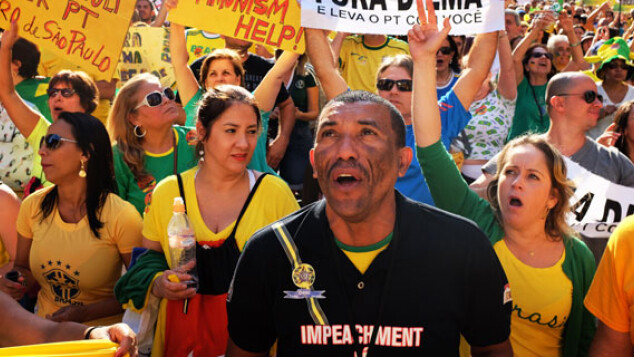Problems at the Carwash
Brazil’s president, Dilma Rousseff looks like she could be the latest casualty of the country’s biggest-ever corruption scandal. Arko Advice Director, Lucas de Aragão, explains how it could play out…

Brazil has quite a history of corruption scandal so it’s quite something for Lava Jato (Carwash) to be the largest and most notorious. But the sobriquet is well earned. Named after a petrol station where some of the alleged transactions took place, so far the ongoing investigation has revealed a multi-billion dollar kickback scheme at the state oil company Petrobras. Since Lava Jato broke it has led to Brazil’s most powerful businesspeople and politicians ending up in jail. Now it looks like it could even cost the president her job.
The road to impeachment

There are various steps to the impeachment process and ‘Brazil watchers’ should keep an eye on key stages along the way. In February the political parties of Brazil elect their leaders. That is normally an important date on the political calendar but this year it has an extra twist because the leaders will choose which members sit on the impeachment committee – so Rousseff will be hoping that sympathetic party leaders emerge victorious. There will be 65 members in this committee, with each party proportionally represented according to the number of seats it holds in Congress.
The committee should be concluded in early March and if it decides in favour of impeachment then the next step is a vote in Congress. Here a two-thirds majority, which would be 342 congressmen, needs to vote in favour of impeachment for it to happen. If that happens – if it does it would be in late March - then it gets passed to the Senate, which has two votes on the matter. In the first vote it would only take a simple majority in favour of impeachment for Rousseff to be temporarily removed from power. Then 45 days later there would be a second vote. If two-thirds of the senate opt for impeachment in this second vote then Rousseff is no longer President of Brazil.
But UK investors need to understand that the party system in Brazil is very different from Britain. Government is through a system of coalition and there are a host of smaller parties that change their voting habits depending on their particular interests at the time. This means that the estimating the outcome of the various votes in the impeachment process is not as simple in the UK where most MPs normally vote along party lines. Rousseff recently won an election, so you would expect her to be easily able to command enough political support to defeat this process. Yet the government’s political incompetence means that we believe there is a 35% to 40% chance of impeachment succeeding.
"UK investors need to understand that the party system in Brazil is very different from Britain…"
One measure of just how unpopular Rousseff has become in Congress have been the vetoes it has issued against her. In theory if Congress approves a piece of legislation that is later rejected by a President, Congress has the right to veto that decision. In practise Congress and the President are normally aligned, so the option to veto is left unexercised. In fact there were unused vetoes dating back to the 1950s. However, Dilma has so alienated Congress that when she vetoed their decision to raise judicial pay by 43% they decided to veto. To do this they actually had to sit through the 120 unexercised, historical vetoes and pass each one, just so that they could get to her one and veto it. That’s unheard of and shows the strength of position against her.
Impact on institutions
Political upheaval like this is dramatic but in the long-term it is more important to look at how Brazil’s institutions will cope. One interesting trend in this regard has been the ‘judicialisation’ of politics in Brazil. Congress in Brazil is very slow to deal with civil society’s issues so the Brazilian Supreme Court has had to step in and deal with those problems. So, if we take abortion as an example, in other countries you’d hope that legislators would pass a law but here the Supreme Court made a ruling to settle it. However, the Presidency and Congress do not work together, which we are seeing at the moment, then public policy stalls and the Supreme Court becomes overworked dealing with society’s issues. At present the Supreme Court holds the key to resolve the Lava Jato scandal but it has a heavy workload. This is also because, unlike the US Supreme Court, Justices in Brazil can not chose which issues they want to rule over but have to face everything that comes through the system to them. So, to give an extreme example, in Brazil if you steal an apple and have enough money, patience and determination, you will end up having your case analysed by the Supreme Court.
Another institution in the spotlight is the Federal Police, which is very well-equipped, highly-trained and independent. Some of the equipment and training has come from the US and Europe, who must think it’s in their interest, but the result is at the very top level, the police with the technology and security clearance, can remotely access any suspect's electronic communication. The combination of equipment, training and technology has made them effective at finding those involved in the corruption scandals.
Impact on the people
This has had a profound effect because businesspeople no longer think that the government can protect them. Brazil has always had corruption but before, if you were a businessman corrupting a public official, you could expect some support if you were caught. But when you have a team of independent investigators hunting you down with top technology, it is hard for a government official to squash that. If you look at the Mensalão vote-buying scandal, there were only two plea bargains because most of those involved thought that they would be protected at some stage. So far with the Lava Jato we’ve had almost 20 plea bargains because those involved realise that they can’t be saved by a corrupt official.
There is also a big impact on the people themselves. Traditionally crime, health, education and unemployment were the four principal concerns of the Brazilian people. Yet if you look at the chart you see that corruption has suddenly appeared as a major worry. It’s not that people have suddenly become aware of this – Brazilians always knew that their political and economic elite were corrupt. The difference with these scandals is that Brazilians have begun to associate corruption with economic failure. In 2010 the economy was still growing, commodities were high and inflation was under control. Then suddenly the economic news starts getting worse just as the corruption scandals start breaking. People start to feel that this is affecting their lives. You have generational shifts. For example in my generation we had a shift from seeing the state as a benefactor that provides everything, to being proud to ‘go private’. Maybe for this generation corruption will be the defining issue.